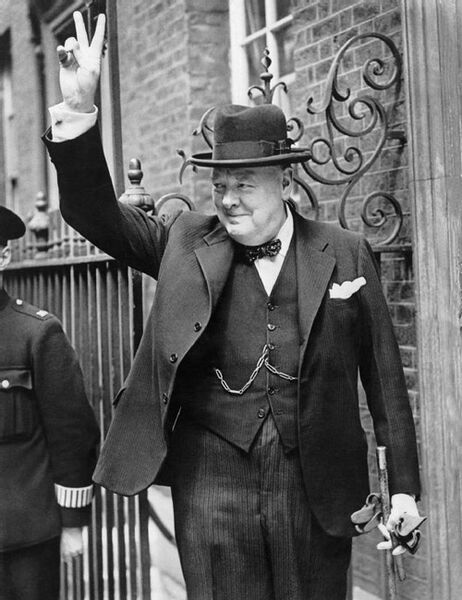File:Churchill v sign 500px.jpg

Summary
Winston Churchill, 1940.05.10. [1]
Original filename: https://i0.wp.com/servetolead.com/wp-content/uploads/2013/05/churchill_v_sign_500px.jpg?w=500&ssl=1
Description
https://servetolead.com/may-10-1940-one-day-one-man/
May 10 1940 | One Day, One Man/
MAY 10, 2022 By JAMES STROCK.
On Friday, May 10, 1940, at 5:35 a.m., the beautiful spring dawn of northwestern Europe was sundered by the unanticipated, unmistakable, ominous, thunderous rumble of heavy artillery fire. Adolf Hitler himself was on the scene, directing the surprise German invasion of Holland and Belgium.
The ruthlessly effective Blitzkrieg that had been loosed upon Poland was now on the move in the West. The Wehrmacht moved with rapid, rehearsed precision through the Low Countries. Its success surprised even the German high command. The Luftwaffe hit French airfields, as well as targets in Holland and Belgium.
Amid the chaos, British prime minister Neville Chamberlain scrambled to hold together his government. Hours of political maneuvering removed any lingering doubt that the premier could not unite his Conservative party, much less Labour and Liberals, into a war cabinet.
Shortly after 6 pm, Winston Churchill was called by a reluctant King George VI to form a new, all-party government.
Evolution of Operation Case Yellow. US Military Academy. Public Domain via Wikipedia.
Churchill Without Illusions
Churchill harbored no illusions about the grievous challenges ahead. The American ambassador to Great Britain, Joseph P. Kennedy, had the temerity to convey what many others assumed: Nazi Germany was militarily invincible. France would surely fall. Soon enough, France would be transformed from ally against Hitler to a launching point for the Luftwaffe and Wehrmacht. The Third Reich would unleash cruel bombardment on English population centers, followed by an invasion.
The British Empire was on the ropes.
Many, surveying the cataclysmic scene arrayed before the new Churchill government, might well wonder whether the old man—he was 65 years old—was irrational in his determination to fight on against the odds, even against the facts. Some might reasonably conclude he was dangerously delusional, marked by the poor judgment that had more than once derailed his career, curtailed his influence.
In fact, Churchill comprehended the threat of Hitler’s regime quite clearly.
His driver, Walter Thompson, congratulated the new prime minister during the ride following his meeting with King at Buckingham Palace. Thompson recalled, “Tears came into his eyes….” Moments later, Churchill added, “God alone knows how great [the challenge] is. I hope it is not too late. I am very much afraid that it is. But we can only do our best.”
The Ultimate Test of Leadership
Almost exactly five years later, Churchill would have the satisfaction of accepting the unconditional surrender and destruction of Hitler’s “thousand-year Reich.”
Thoughtful observers disagree about the relative magnitude of the contributions of the many individuals and nations and historical trends that came together to occasion Allied victory in the Second World War.
What no one can doubt is that its course was altered by the determination of this one, anachronistic, sublimely willful individual.
The ultimate metric by which to evaluate anyone’s leadership is: Would things have been different, absent their individual contribution?
In most circumstances, a dispassionate examination must conclude that while one’s contribution may have been significant, the results would have been largely the same in others’ hands.
Churchill’s example resonates and inspires, because his individual role was demonstrably indispensable to the outcome.
What About You?
In your own leadership journey, have you encountered situations in which your personal contribution drove results—results that may not have otherwise occurred?
When you reflect upon leaders in business, the arts, government, your community and family, where do you discern such leadership?
What sets them apart?
What can be learned from them?
How are you preparing to make your own unique contribution?
Winston Churchill, for all his expressed belief in his own star, cannot have foreseen the precise circumstances that would befall his nation or himself. Nonetheless, when the moment of truth arrived, he was prepared.
Are you preparing for your own moment of truth?
May 10 1940 | One Day, One Man
References
- ↑ https://servetolead.com/may-10-1940-one-day-one-man/ May 10 1940 | One Day, One Man/ MAY 10, 2022 By JAMES STROCK. On Friday, May 10, 1940, at 5:35 a.m., the beautiful spring dawn of northwestern Europe was sundered by the unanticipated, unmistakable, ominous, thunderous rumble of heavy artillery fire. Adolf Hitler himself was on the scene, directing the surprise German invasion of Holland and Belgium. ..
File history
Click on a date/time to view the file as it appeared at that time.
| Date/Time | Thumbnail | Dimensions | User | Comment | |
|---|---|---|---|---|---|
| current | 06:38, 5 June 2022 |  | 500 × 649 (88 KB) | T (talk | contribs) | <div style="margin:-18px -14px 0px -200px; background-color:#fff"> <div style="margin:0px 0px 0px 30px; line-height:1.16em"><br> Winston Churchill, 1940.05.10. <ref> https://servetolead.com/may-10-1940-one-day-one-man/ May 10 1940 | One Day, One Ma... |
- You cannot overwrite this file.
File usage
The following page links to this file: